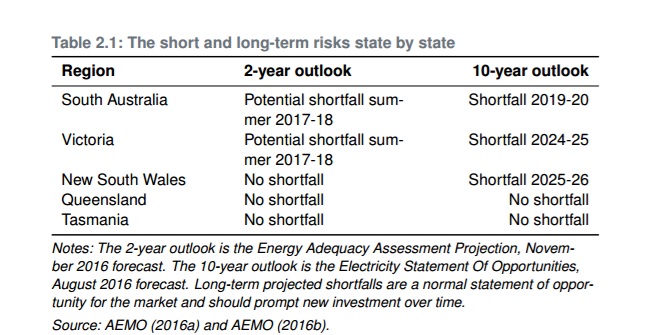Panicking politicians who make kneejerk decisions to bolster Australia’s energy security run the risk of fuelling a power crisis with more blackouts and restrictions, according to a report from the Grattan Institute.
The report, to be released on Monday, warns the next flashpoint could be as early as next summer unless energy authorities find extra capacity to avoid a repeat of last September’s blackouts in South Australia and potential outages in Victoria.
The report said regulators have around six months to agree on broad national reforms that go beyond uncoordinated individual actions, such as the Federal Government’s proposed Snowy Hydro 2.0 and South Australia’s “go it alone” plan to fund 100 megawatts of battery storage technology.
Grattan Institute energy program director Tony Wood told the ABC’s AM program that rushed responses by politicians exposed consumers and businesses to higher energy prices and put the Government’s emissions reduction targets in danger.
“A decade of toxic political debates, mixed messages and policy backflips has prevented the emergence of credible climate change policy,” Mr Wood said.
“But if governments take matters fully into their own hands, the results are likely to be painful.
“Customers will pay more for their electricity, supply could become even less reliable, and Australia still may not achieve the emissions reductions required.”
Grattan describes South Australia as “the canary in the coalmine” given that wind has supplied more than half of its electricity consumers so far in 2017, while most other states get less than 10 per cent from wind and solar.
South Australia is exposed to outages given that, at times, wind supplies 75 per cent of the state’s energy needs, the report said.
The report urged reforms in the national energy market with the creation of new rules to ensure a reliable supply and efficient responses when part of the system breaks.
AEMO has ‘critical job’ to avoid blackouts next summer
While a national energy security plan is negotiated, the report suggested some currently mothballed generators should be recalled to ensure reserves are on hand in an emergency.
Mr Wood said the “go it alone” plans created uncertainty and risk, destroying opportunities for the National Electricity Market (NEM) to drive new investment in Australia for low-cost, low-emissions electricity.
“If that (lack of investment) happens, the NEM will have been judged to have failed when it will have surely been systemically, if unintentionally, destroyed,” Mr Wood said.
Independent senator Nick Xenophon yesterday warned that a national crisis on reliable gas supply could turn into a national emergency, pointing to the risk of “our Argentina moment”.
“Years ago Australia and Argentina were the richest countries in the world, Argentina went down a path of bad strategic decisions and policies, and slid down a road into poverty and chaos,” Senator Xenophon told Insiders.
“If we don’t deal with the gas crisis, Australia will see its living standards decline substantially and it will plunge us into very high levels of unemployment and scar our manufacturing sector on a long-term basis. We need to tackle this head on.”
In “Powering Though: how to restore confidence in the National Energy Market”, Grattan suggests power generators should be rewarded for being flexible and responding quickly to shortages.
At the same time, the report said consumers should receive financial incentives to relieve stress on the system by limiting the power they use at peak times.
The report said the Australian Energy Market Operator (AEMO) has “a critical job” to avoid blackouts in South Australia and Victoria next summer.
It also pointed to the possibility of short-term outages in New South Wales, given pressure on the state power grid during heatwave conditions earlier this year.
Follow Peter Ryan on Twitter @peter_f_ryan and on his Main Street blog.













